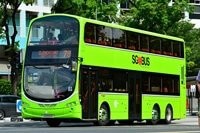
Agreement reached with incumbent operators in Singapore over the future of the bus network
SINGAPORE: The Land Transport Authority (LTA) in Singapore has reached agreement with SBS Transit and SMRT Buses for 11 bus packages under the bus contracting model, which will come into effect on September 1, 2016. This will complete the transition of the public bus industry to the bus contracting model.
When these negotiated contracts expire, they will also be put out for competitive tendering, like the Bulim, Loyang and Seletar packages. Tower Transit is now running Bulim while Go-Ahead will start Loyang shortly. An announcement on who has secured Seletar which was put out to tender in June 2016 is awaited. It’s expected to start in the first half of 2018.
This gradual, phased approach to competitive tendering minimises risk of service disruption for commuters, says the LTA, enabling it to refine and improve on the management of contracts, as well as the tendering and handover processes.
Of the 11 packages, SBS Transit will operate eight packages with 196 services while SMRT Buses will run three with 77 routes. Contracts are for durations ranging from two to 10 years, taking into consideration, amongst others, the completion timeline of supporting infrastructure such as bus depots, and to ensure a gradual schedule of bus packages being put out for tendering.
The packages are of varying sizes, and have different compositions of bus services with different route lengths. The estimated total contract fees are S$5,322m for SBS Transit and S$1,865m for SMRT Buses. The contract sums were reached through negotiations with the operators.
As there is no change in operators for the bus services and infrastructure in these 11 packages, no handover of assets is needed. Existing bus employees will not be affected.
Under the bus contracting model, LTA will own all operating assets including buses and lease them to the operators. This allows LTA to respond to changes in ridership in a timelier manner. In preparation for the transition, LTA has been buying additional buses since 2012 under the Bus Service Enhancement Programme and replacement buses since 2015.
There remain about 4,000 buses that are owned by SBS Transit and SMRT Buses at the moment. During the tenures of the negotiated contracts, LTA will lease these buses from the operators by paying an availability fee that is equivalent to the depreciation value of the buses. The financial cost of this is the same as buying over the buses now at net book value.
In addition to operating and managing bus services to specified performance standards, SBS Transit and SMRT Buses’ other responsibilities include:
- Operate, manage and maintain the buses and their on-board equipment;
Operate, manage, and maintain their respective bus depots, bus interchanges and bus terminals, including all equipment and systems therein;
iii. Charge and collect fares as approved by the Public Transport Council, on behalf of the Government, for travel on the bus services in the packages;
iv. Provide bus service information at all bus stops and bus interchanges served by the bus services; and
v. Provide customer management services, such as lost and found service, and a hotline for commuter feedback and enquiries.
LTA’s Chief Executive Chew Men Leong said: “With the completion of the transition, not only will the bus industry be put on a financially more sustainable footing, but commuters can expect higher bus service levels throughout Singapore.” All bus services will have scheduled headways of no more than 15 minutes for both directions during the morning and evening peak periods, with at least half of them having scheduled headways of no more than 10 minutes. Feeder services will run at intervals of six to eight minutes.”
SBS Transit Chief Executive Officer Gan Juay Kiat, said: “We are glad that we have been able to successfully conclude the terms of the NC (Negotiated Contract) with the LTA and look forward to a new era in Singapore’s public bus transport industry. While this Bus Contracting Model is a more sustainable model for the long term, commuters can also expect higher service levels as bus services will progressively come under the NC’s Bus Service Reliability Framework. This means better regularity of buses calling at bus stops.”
Managing Director, SMRT Buses, Tan Kian Heong said: “We welcome the transition of our bus operations to the Bus Contracting Model (BCM) where the Government will keep all fare revenue while SMRT Buses will be paid a service fee to operate the bus services. SMRT has always been committed to delivering high levels of operational reliability, safety and service. The transition to the BCM will allow us to have a stronger focus on these areas and better fulfill our role as a public transport operator for the benefit of all our commuters.”

